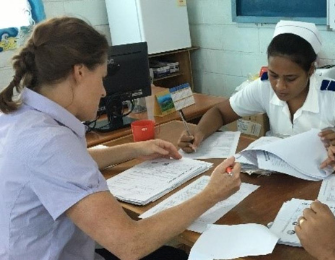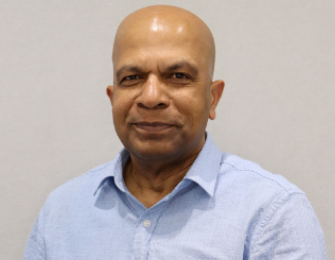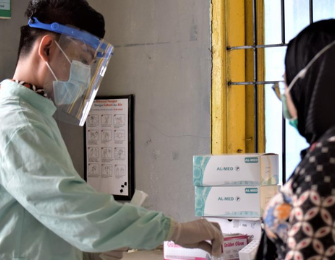Kiribati Ministry of Health, along with help from an Australian infection prevention control (IPC) adviser were able to trial new training and processes during an outbreak of measles, a fortuitous test run ahead of preparing for potential COVID-19 outbreaks in the Pacific nation. Following a review of their health security needs in 2017, the Kiribati Government requested support to strengthen infection prevention and control (IPC) in their health facilities.

The island nation of 110,000 people has four hospitals, 37 health centres and 72 clinics. This led to the recruitment of Louise (Lou) Carrington through the Indo-Pacific Centre for Health Security to work with the Kiribati Health Ministry as an IPC specialist based at the main referral hospital, Tungaru Central Hospital, between October 2019 and March 2020. In a small team along with two nursing officers, Lou helped to develop a comprehensive IPC program.
Through auditing, surveillance and education, IPC practices were improved across the hospital with the team reporting a 26% improvement in hand hygiene. Lou also helped establish an IPC professional support network between the Kiribati and Fiji nursing teams. This has proven a great resource for sharing locally relevant IPC knowledge between Pacific neighbours. During Lou’s deployment, a small measles outbreak tested the new IPC procedures. In late December, a coalition of assistance including the Kiribati Ministry of Health, World Health Organisation and UNICEF was quickly brought together to address a small number of cases connected to a large outbreak in neighbouring Samoa.
On Christmas Day, Lou joined the Ministry of Health and other partners to set up a measles triage and screening site at the hospital. She ensured the screening processes incorporated IPC best practice. “It was a good dress rehearsal for COVID-19 because the Ministry of Health needed to establish an emergency operations centre, review point of entry and screening processes, coordinate the allocation of health resources, establish screening and contact tracing procedures whilst ensuring education and a staff health and public vaccination campaigns were delivered. The response included repurposing an eight-bed private ward into a measles isolation ward. Lou worked with the team to provide education and IPC infrastructure in the newly designated isolation ward. By late January, the risk of measles spreading among the community returned to low levels and the ward returned to normal operations.
However, the threat of COVID-19 was already making itself felt and the emergency operations quickly shifted focus to this new disease threat in early March. “There wasn’t much break. The Kiribati health team just had to kick off again,” she said.
Lou helped the staff to audit and prepare personal protective equipment such as donning and doffing procedures and the proper fitting of N95 masks. To date, there have been no COVID-19 cases in Kiribati but the swift response by the Kiribati Government and the hard work of the health staff, including the IPC team mean they are ready to respond if needed. Lou returned to Australia in March this year. She has continued her advisory and mentoring role to the d Kiribati IPC program throughout the pandemic remotely.
Drawing on her experience from Kiribati, Lou is now assisting another small Pacific Island nation, Nauru, to prepare for COVID-19 cases. Lou will provide the Health Ministry with additional help and advice in IPC make sure Nauru is also ready to tackle COVID-19 if needed.




